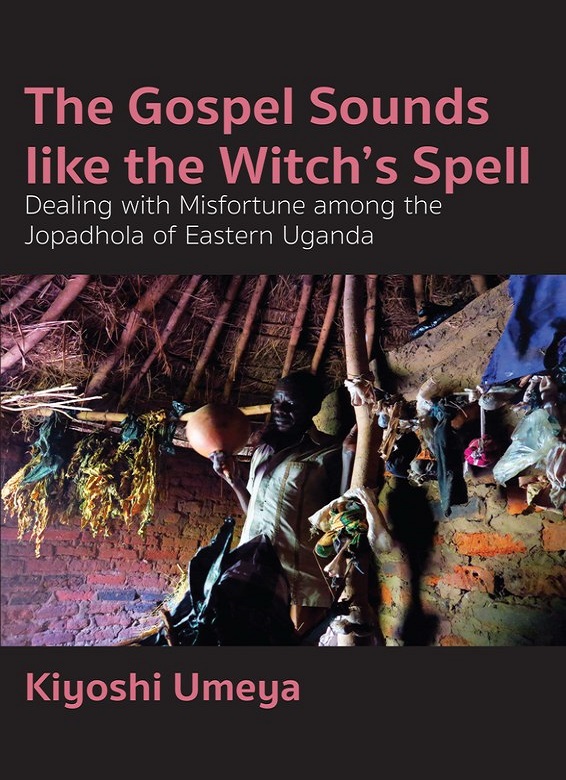written by Kiyoshi Umeya
Dealing with Misfortune among the Jopadhola of Eastern Uganda
The Gospel Sounds Like the Witch’s Spell is a highly detailed ethnography about how the Jopadhola in eastern Uganda talk about, interpret and cope with death, illness and other misfortunes. The book presents a provocative discussion that critiques the idea of the revival of witchcraft in the neo-liberalised contemporary world, as represented by the ‘modernity model of witchcraft’, and attempts to formulate a ‘spiderweb model’ that connects witchcraft to contemporary society in a more complex manner. The book is a unique ethnography of the collective memory of indigenous knowledge and local historicity. The author moves the reader from curse to misfortune to fortune as he plots the notion of ‘curse’ as deeply embedded in the Adhola way of life. He weaves between culture, religion, state and modernity with lived experience. Did the concept of witchcraft unwittingly endear the Adhola to the Christian way of life because of the presence of the notion of ‘curse’ in the Bible or make them less susceptible to the vagaries of modernity compared to their neighbours? These are some of the questions that the author puts on the table in a deeply reflective manner. The phenomenon of witchcraft is given an intriguing angle that invites the reader to reexamine earlier anthropological writings on the subject among African peoples.


| ISBN | 9789956552412 |
| Pages | 766 |
| Dimensions | 244 x 170mm |
| Illustrations | Colour Illustrations |
| Published | 2022 |
| Publisher | Langaa RPCIG, Cameroon |
| Format | Paperback |



4 comments
“Studying a people and living among them since 1997 gives the author a powerful perspective in presenting a rich ethnography that weaves experiences, interpretations and representations of the notion of witchcraft among the Jopadhola of eastern Uganda. The author moves the reader from curse to misfortune to fortune as he plots the notion of ‘curse’ as deeply embedded in the Adhola way of life. He weaves between culture, religion, state and modernity with lived experience. Did the concept of witchcraft unwittingly endear the Adhola to the Christian way of life because of the presence of the notion of ‘curse’ in the Bible or make them less susceptible to the vagaries of modernity compared to their neighbours? These are some of the questions that the author puts on the table in a deeply reflective manner. The phenomenon of witchcraft is given an intriguing angle that invites the reader to reexamine earlier anthropological writings on the subject among African peoples. I attest to the thoroughness with which the author approached his fieldwork.”
Edward K. Kirumira, Professor of Medical Sociology and Director, Stellenbosch Institute for Advanced Study
“This book is a highly detailed ethnography about how the Jopadhola in eastern Uganda talk about, interpret and cope with death, illness and other misfortunes. The author has succeeded in depicting these processes in scrupulous detail, based on material obtained over 20 years of field research. People’s experiences are shaped through a complex intertwining of various factors related to each event, and through tenacious interpretations of misfortunes that sometimes contradict each other.”
Itaru Ohta, Emeritus Professor, Kyoto University, Former President, Japan Association for African Studies
“Under the disguise of his theoretical modesty, lurks the author’s very ambitious project both ethnographical and theoretical. With vivid descriptions and penetrating insights, this book is one of the exemplary masterpieces created within a Japanese tradition of field research, sustainedly conducted in a single society over a quite long-time span, often exceeding twenty years.”
Mitsuru Hamamoto, Emeritus Professor, Hitotsubashi University and Kyushu University
“This book presents a provocative discussion that critiques the idea of the revival of witchcraft in the neo-liberalised contemporary world, as represented by the ‘modernity model of witchcraft’, and attempts to formulate a ‘spiderweb model’ that connects witchcraft to contemporary society in a more complex manner. The book is a unique ethnography of the collective memory of indigenous knowledge and local historicity. The foundation of this book is the comprehensive and precise fieldwork that has long been a hallmark of cultural anthropology in Japan. It is not unusual for Japanese cultural anthropologists to spend their whole life in a single field. The materials and written records that the author, a Japanese anthropologist, has compiled over decades of work will serve well as regional archives.”
Motoji Matsuda, Emeritus Professor, Kyoto University, Former President, Japanese Society of Cultural Anthropology